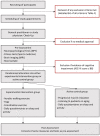Impact of an online guided physical activity training on cognition and gut-brain axis interactions in older adults: protocol of a randomized controlled trial
- PMID: 37781101
- PMCID: PMC10539595
- DOI: 10.3389/fnagi.2023.1254194
Impact of an online guided physical activity training on cognition and gut-brain axis interactions in older adults: protocol of a randomized controlled trial
Abstract
Introduction: By 2050, the worldwide percentage of people 65 years and older is assumed to have doubled compared to current numbers. Therefore, finding ways of promoting healthy (cognitive) aging is crucial. Physical activity is considered an effective approach to counteract not only physical but also cognitive decline. However, the underlying mechanisms that drive the benefits of regular physical activity on cognitive function are not fully understood. This randomized controlled trial aims to analyze the effect of an eight-week standardized physical activity training program in older humans on cognitive, brain, and gut-barrier function as well as the relationship between the resulting changes.
Methods and analysis: One-hundred healthy participants aged 60 to 75 years will be recruited. First, participants will undergo an extensive baseline assessment consisting of neurocognitive tests, functional and structural brain imaging, physical fitness tests, and gut-microbiome profiling. Next, participants will be randomized into either a multi-component physical activity group (experimental condition) or a relaxation group (active control condition), with each training lasting 8 weeks and including an equal number and duration of exercises. The whole intervention will be online-based, i.e., participants will find their intervention schedule and all materials needed on the study website. After the intervention phase, participants will have their post-intervention assessment, which consists of the same measures and tests as the baseline assessment. The primary outcome of this study is the change in the cognitive parameter of visual processing speed from baseline to post-measurement, which will on average take place 10 weeks after the randomization. Secondary outcomes related to cognitive, brain, and microbiome data will be analyzed exploratory. Clinical trial registration: https://drks.de/search/de/trial/DRKS00028022.
Keywords: cognition; fMRI; healthy; microbiome; older adults; online intervention; physical activity.
Copyright © 2023 Schrenk, Brodoehl, Flor, Frahm, Gaser, Hamdan, Herbsleb, Kaleta, Kattlun, Müller, Puta, Radscheidt, Ruiz-Rizzo, Saraei, Scherag, Steidten, Witte and Finke.
Conflict of interest statement
The authors declare that the research was conducted in the absence of any commercial or financial relationships that could be construed as a potential conflict of interest.
Figures



References
LinkOut - more resources
Full Text Sources

